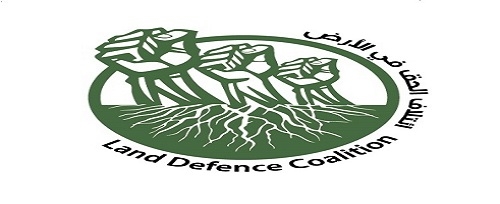Promoting accountability for improving the human right to water and sanitation in Palestine عودة إلى المشاريع
مدّة المشروع: 1 an(s)
Dec 2016 Dec 2017Budget du projet:
23 يورو (€)
شارك المشروع على
الهدف العامّ
Strengthening the role of Palestinian CBOs and CSOs as a watchdog and as proactive actorsinfluencing policy, in particular in the WASH sector, as part of developing social democraticstructures and respect of good governance principles by national and other policy makersandstakeholders.Increased respect for water and sanitation rights (WASH rights) and better WASHconditions are a key element for growth of the Palestinian rural sector and the very survivalof the most vulnerable communities (Area C, Bedouin communities).
أهداف خصوصيّة
- CBO capacity building.
- Alliance building.
- Effecting change in attitude and policy.
مزيد من التفاصيل
- Project duration:12 months
Beneficiaries:
- Direct beneficiaries:
- Land Defense Coalition and its members, in particular the Popular Council to Protect the Jordan Valley
- Communities particularly affected by WASH problems, such as the 26 communities in the Jordan Valley (appr. 60 000 people) and communities in the Southern Hebron Hills (appr. 4,000 people).
- Indirect beneficiaries:
- WASH affected communities in the West Bank (appr. 200 000 people without connection tothe water network, 300,000 people in water access restricted areas and affected bydamages and deterioration of WASH systems;
- 200,000 people without access to safedrinking water; 100,000 in need of basic sanitation and hygiene services)
- Palestinian and international CSOs, policy makers.
Main activities:
- A.1.1 Desk research to collect and analyse the existing documentation in the Palestinian WASH sector.
- A.1.2 4 workshops (WS) (participants: 15-25 representatives of local communitiesand grassroots CBOs, incl. participants of the Right to Water Campaign).
- A.1.3. 2 community meetings: 1 meeting in the Jordan Valley(appr. 50 people), 1 meeting in the southern Hebron Hills (appr. 30 people), to present anddiscuss the workshop outcomes at community level.
- A.1.4. Field and desk research to fill gaps of information, ensurecontinuous updates, human impact stories.
- A.2.1. 1 meeting with Palestinian CSOs active in the WASH sector (15 participants: 7-10 reps of Pal CSOs, beneficiaries of WP1) to discuss the proposal for research and policy demands.
- A.2.2. 1 meeting with INGOs/WASH Cluster Coordination to present the outcomes of the A.2.1. meeting and discuss possible cooperation
- A.2.3.Continue coordination role for the existing international coalition to demand accountability for Israeli violations of the Palestinian right to water.
- A.2.4. Information collection of successful solidarity campaigns to support Palestinian WASH rights.
- A.3.1. Right to Water Campaign implementation.
- A.3.2. 4 meetings with Palestinian Water Authority (PWA), including reps from beneficiaries and Pal CSOs.
- A.3.3. Continued follow up with legal case in Israeli courts on Mekorot’s refusal to respect the 2009 agreement with PWA.
- A.3.4. Organise publicawareness actions with the international network (see A.2.3.) on the United Nations World Water Day (March 22), including the presentations of demands and stories by beneficiaries.
- A.3.5. 1 Europee speaking tour to raise awareness, lobby EU policy makers, strengthen regional networking and exchange experiences with CSOs working on WASH sector.
Expected results:
- R.1.1. The beneficiaries will be aware of water rights and their capacity to peacefully and democratically influence decision processes and policy making.
- R.1.2. Beneficiaries create a work plan and necessary information for the engagement of policy makersandStakeholders.
- R.2.1. LDC and JVC network effectively with other beneficiaries and CSOs in the West Bank, including MA’AN development centre, Palestinian Hydrology Group, PENGON, EWASH, strengthening WASH sector coordination.
- R.2.2. Common demands, innovative and participatory dialogue/accountability mechanisms are created.
- R.2.3. INGOs and international solidarity support the demands of Palestinian CSOs regarding the WASH sector.
- R.2.4. Beneficiaries exchange experiences with other CSOs working in WASH sector.
- R.3.1. More people are aware and concerned about the issue and solutions, helping to build a critical mass.
- R.3.2. Beneficiaries and stakeholders effectively engage in dialogue with local and international institutions.
- R.3.3. PA, in particular, the Palestinian Water Authority positively responds to CSOs demands and takes them into account.


